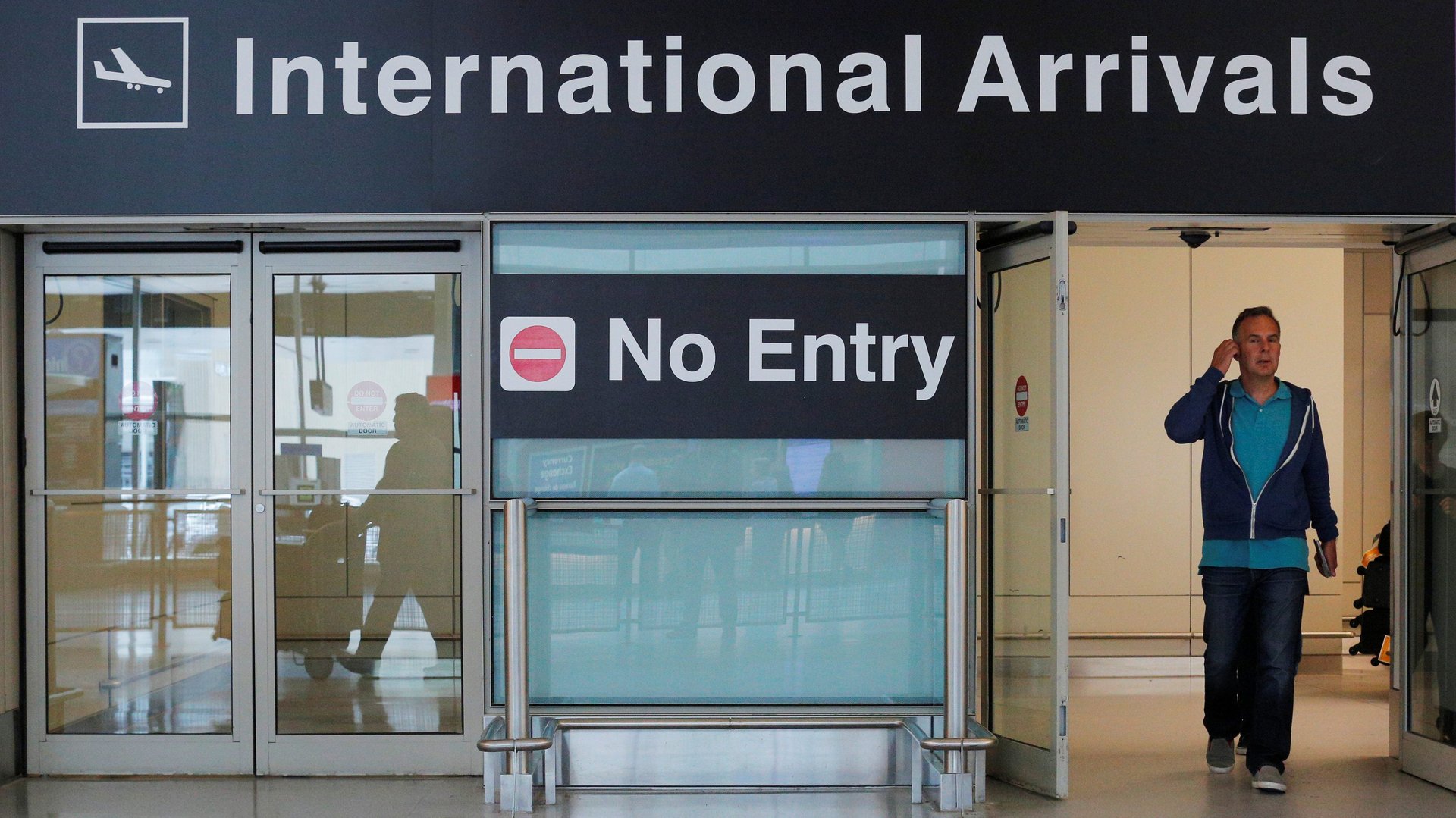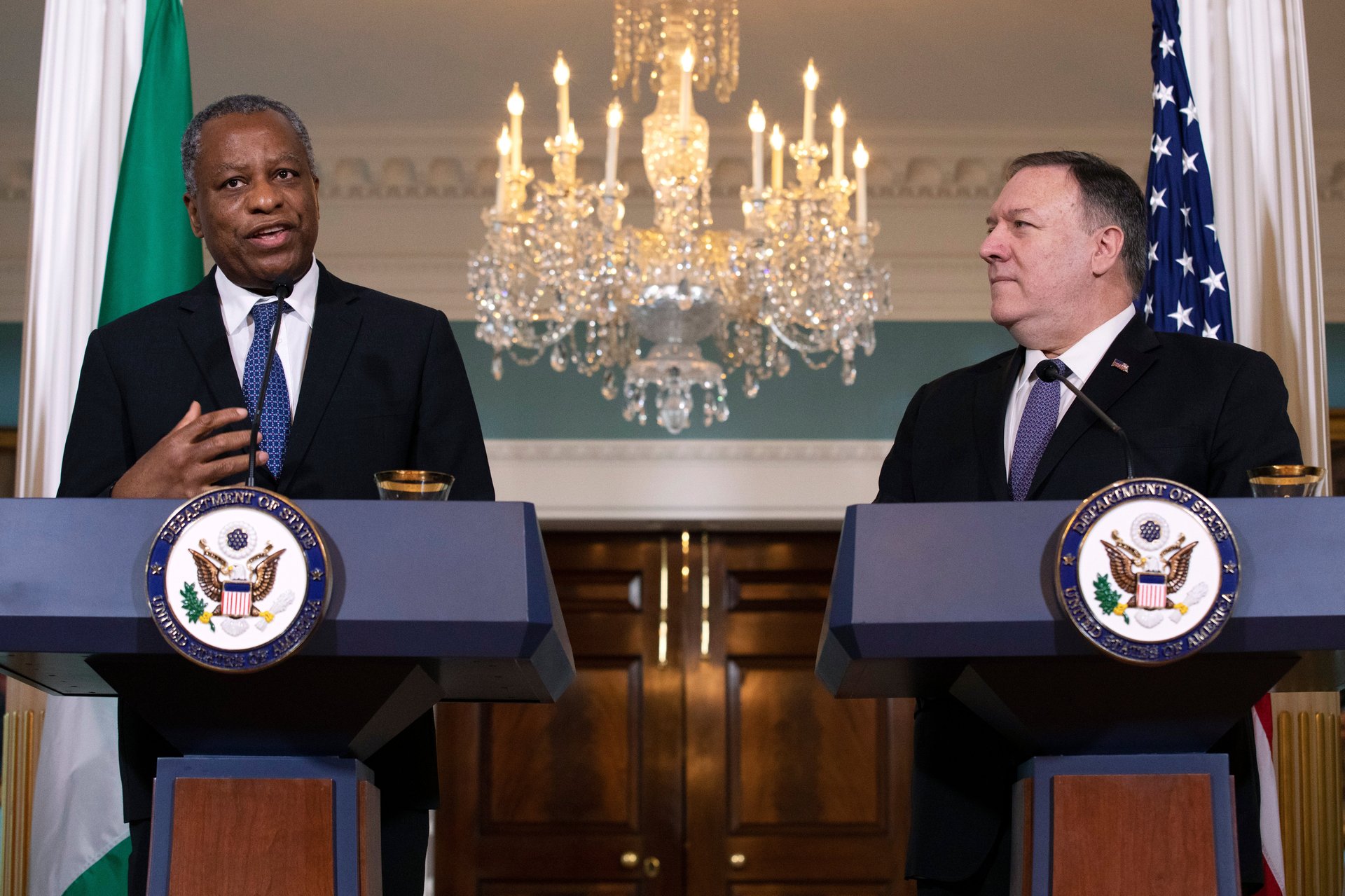Trump’s visa restrictions on Nigerians point to a lack of government and diaspora political clout
Last week the Trump administration expanded its contentious “travel ban” to impose visa restrictions on six more countries, including Africa’s most populous nation, Nigeria.


Last week the Trump administration expanded its contentious “travel ban” to impose visa restrictions on six more countries, including Africa’s most populous nation, Nigeria.
Nigerians can still travel to the US on temporary nonimmigrant visas as students, workers, or tourists, but from Feb. 21, when the law goes into effect, Nigerians will no longer be able to obtain visas allowing them to permanently immigrate to the US.
While Nigerian elite resent being lumped in with “pariah states” like Myanmar, other nationals see the Trump administration’s decision as symbolic of Nigeria’s current poor international standing, and particularly its lack of political clout in the US. Despite being the so-called “Giant of Africa” with the largest economy on the continent and one of the best educated migrant populations in the US, it seems to lack sufficient political representation and civic participation in the US.
Migrant groups in the US like the Liberian community were part of a class action lawsuit against the Trump administration for initially threatening to cancel the Deferred Enforced Departure status held by about 4,000 Liberians in the US; (they were granted a path to citizenship last month). Liberians, unlike Nigerians, have a long history of political organizing and advocacy in the US. Liberian groups organized in Minnesota and Rhode Island and were championed by their Congress representatives who managed to bury the provision in a $738 billion defense appropriation bill under “Other Matters.” The bill, which was signed into law on Dec. 20, allowed these Liberians to apply for green cards.
Nigerians in the United States have not been as politically strategic.
“We’re not politically inclined and we do not follow politics the way we’re supposed to like other cultures,” said Nneka Achapu, a former immigrant rights strategist at the Texas chapter of the American Civil Liberties Union. Achapu is the founder of AfriPAC, a non-partisan political group advocating for policies that empower the African diaspora. It was created to address this very problem. “I felt that in order for us to have an impact we have to have a seat at the table. Power is not given; it’s taken.”
“Other groups have some kind of status, they’re able to get things fixed because they lobby,” Achapu says. “But [Nigerians] just say that is the law. Just the same way we fight for our money, the same hunger that makes us strive for success, should make us want to strive for political clout.”
First-generation Nigerians in America might have left less faith in democratic systems because of their experiences at home and have instead focused more on economic achievement to their own detriment. “We claim to have all this money and education, but when it comes to political power, we have nothing,” says Achapu.
Emeka Onwezi, a Nigerian-American immigration attorney in Maryland agrees. “During the last election, we had town hall meetings where we invited politicians and Nigerians didn’t show up. They will not vote; some of them will prefer to work overtime.”
Community organizers like Onwezi and Achapu recognize that political participation permeates and dictates political prestige—from the president’s policies to advocacy and support from legislative representatives. “If you don’t come out to vote or campaign, when they get elected, they won’t remember you. If you live in America, you have to understand this is your home too,” Onwezi said.
For both Onwezi and Achapu, the Nigerian government is also partly to blame for the country’s inclusion on the travel ban list, as president Buhari’s government has created conditions that the Trump administration has been able to exploit. It also doesn’t help that Nigeria is still in a decade-long battle with Islamic State-backed terrorist groups in the country’s northeast.
Given the two weeks between the early speculation about the countries on the expanded ban and the final announcement there might have been some expectation a country with Nigeria’s profile might have been able to talk itsef off the list via diplomatic backchannels while fixes were being made. This was not to be.
But Nigeria’s shortcomings notwithstanding, Onwezi sees Trump’s decision as a “political” move. “This is election year. There’s impeachment going on. [Trump] is doing this just to make his base happy.”
As part of its justification for imposing the ban, the administration cited concerns about Nigeria’s security standards, and increasing terrorist threats. It claims it wants to see Nigeria improve information-sharing with the US and Interpol to help identify criminals and terrorists.
But the group of visas targeted raises questions about the rationale for the ban. “The category that he is banning, it doesn’t make any sense as applicants for immigrant visas, except those reuniting with their spouses, often go through years of rigorous vetting,” said Onwezi. “People on temporary visas don’t do rigorous screenings like permanent residents.”
One of Onwezi’s clients in Maryland has been waiting for a decade to be reunited with his brother in Lagos; now, owing to the ban, the brothers will have to wait even longer. “If the US wants to make a difference, they could have banned Nigerian officials, instead of banning innocent people.”
“Blindsided”
The ban was announced on the eve of the 2020 U.S.-Nigeria Binational Commission Meeting on Innovation and Ingenuity in Washington DC. Nigeria’s foreign minister, Geoffrey Onyeama, was reported to say the Nigerian government was “somewhat blindsided” by the announcement.

Onyeama added that Nigeria was working to resolve the concerns that led to the ban. “We are putting in place the architecture that will make the data on that immediately available to the US and all the member countries of Interpol.”
Nigerian president Muhammadu Buhari launched a committee to “study & address updated US requirements,” the president tweeted on Saturday.
Black immigrant rights groups see the decision as part of a wider trend in the administration’s efforts to curb black migration. From threatening to cancel the Deferred Enforced Departure program for Liberians and Temporary Protected Status for Somalis to even the public charge rule.
“It just doesn’t make sense,” says Amaha Kassa, founder of African Communities Together, a civil rights organization for African immigrants. “It suggests what is going on here is a move to keep US citizenship white and European.
“This is what it’s like to be an African in this moment when xenophobia on the rise,” Kassa said.
His group was part of the class action lawsuit with the Liberian community against the Trump administration.
Kassa admits there’s room for better political organizing among the African diaspora. “There’s always been this visitor mentality among Africans. We’re here to work, not to stay. That has to change.”
One key aspect of that is the upcoming census on April 1st. “People need to respond when they receive the census form. That form can’t be used for immigration and tax enforcement,” Kassa said. “If you aren’t counted then you don’t count.”
For Achapu, a Nigerian-American in Houston who immigrated to the US from Italy as a teenager, Nigerians are scrambling to make sense of the policy, but the travel ban could be a rare opportunity to mobilize.
“All these policies that are affecting us it’s because nobody is saying anything,” she said. “I think this will be a wake-up call.”
Sign up to the Quartz Africa Weekly Brief here for news and analysis on African business, tech and innovation in your inbox